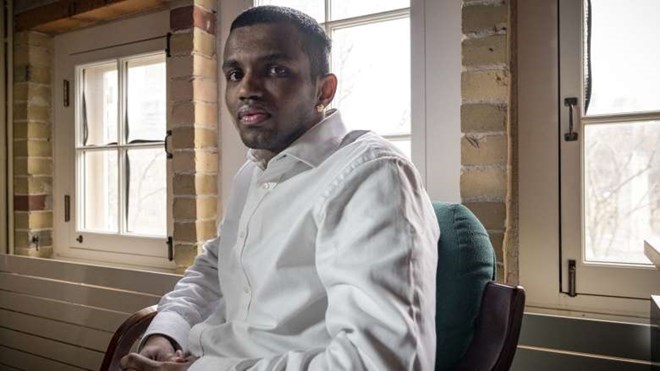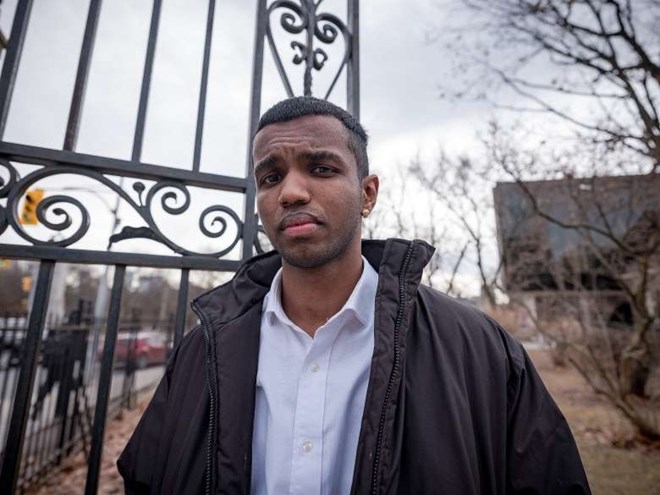
Wednesday May 30, 2018
By Aly Thomson
Former child refugee grew up in N.S. foster care, but officials never applied for his citizenship

Abdoul Abdi came to Canada as a child refugee with his sister and aunts. He was never given citizenship. (Evan Mitsui/CBC)
Two advocacy groups are seeking to intervene in the judicial review of the case of Abdoul Abdi, a former Somali child refugee fighting to stay in Canada.
Lawyers for the Canadian Civil Liberties Association and Justice for Children and Youth argued in Federal Court on Tuesday that their groups would offer unique perspectives about the issues surrounding Abdi's case.
The Canada Border Services Agency detained Abdi, who was never granted Canadian citizenship while growing up in foster care in Nova Scotia, after he served about five years in prison for multiple offences including aggravated assault.
The application for judicial review seeks to challenge the government's decision to refer his case to a deportation hearing, arguing the decision was unreasonable, unfair and contrary to the Charter of Rights and Freedoms and international law.
Some children in care left unprotected from deportation
Both groups argued before Justice Ann Marie McDonald in Halifax that their positions would assist the court in arriving at a decision in Abdi's case — one they claim will have wider implications for vulnerable youth in Canada.
"Young people who have grown up in the care of various child welfare organizations across the country are often placed in a position where they are not provided with adequate protection, in the sense that they haven't been provided with an opportunity to apply for Canadian citizenship," Jane Stewart, a lawyer for the Justice for Children and Youth, said outside court.
"They're then exposed to the jeopardy of deportation as adults in a way that other young people may not be. It's a situation that affects Mr. Abdi, but unfortunately it's a case that affects young people across the country. His situation isn't unique and it's a situation that plays out over and over again."
Nasha Nijhawan, a lawyer for the Canadian Civil Liberties Association, said her organization wants to ensure that any time government is making a decision such as this, "it does so in a manner that's in accordance with Charter values and takes into account any Charter issues that are raised by the facts of that case."
"It raises questions about where the Charter fits into that analysis and how Canadians or permanent residents of Canada might expect the protection of their rights and freedoms in that context," said Nijhawan.
"It's a question of perpetuating disadvantage against someone who has suffered disadvantage in the past."
Abdi 'stressed' by situation
But Heidi Collicutt, a lawyer representing the Minister of Public Safety, argued the groups did not meet the criteria to be intervenors in the case.
Collicutt argued the groups do not offer a unique perspective, but rather bolster and supplement Abdi's position.McDonald reserved her decision.
Abdi's lawyer Benjamin Perryman said his client is feeling stressed ahead of the judicial review hearing, scheduled for June 19 in Federal Court in Halifax.
"He's still in this place of limbo," said Perryman. "When the government of the country you've lived your whole life in is seeking to deport you to a warzone, that is obviously stressful, and that uncertainty I think would be crippling to most Canadians."
 Abdi's
case has prompted supporters to call on the Nova Scotia government to
intervene on his behalf, and sparked protests at events with federal
leaders including a town hall earlier this year with Prime Minister
Justin Trudeau in Lower Sackville, N.S. (Evan Mitsui/CBC)
Abdi's
case has prompted supporters to call on the Nova Scotia government to
intervene on his behalf, and sparked protests at events with federal
leaders including a town hall earlier this year with Prime Minister
Justin Trudeau in Lower Sackville, N.S. (Evan Mitsui/CBC)
Abdi came to Canada as a toddler
Abdi, who was born in Saudi Arabia in 1993, lost his mother in a refugee camp when he was four and came to Canada with his sister and aunts two years later. He was taken into provincial care shortly after arriving in Canada.
He was moved 31 times between foster homes. He lost his native language and developed behavioural problems that advocates say were not adequately treated. Those issues led to problems with the justice system and his non-citizenship put him at risk of deportation.
Abdi's case has prompted supporters to call on the Nova Scotia government to intervene on his behalf, and sparked protests at events with federal leaders including a town hall earlier this year with Prime Minister Justin Trudeau in Lower Sackville, N.S.